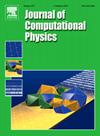Computing ground states of Bose-Einstein condensation by normalized deep neural network
IF 3.8
2区 物理与天体物理
Q2 COMPUTER SCIENCE, INTERDISCIPLINARY APPLICATIONS
引用次数: 0
Abstract
We propose a normalized deep neural network (norm-DNN) for computing ground states of Bose-Einstein condensation (BEC) via the minimization of the Gross-Pitaevskii energy functional under unitary mass normalization. Compared with the traditional deep neural network for solving partial differential equations, two additional layers are added in training our norm-DNN for solving this kind of unitary constraint minimization problems: (i) a normalization layer is introduced to enforce the unitary mass normalization, and (ii) a shift layer is added to guide the training to non-negative ground state. The proposed norm-DNN gives rise to an efficient unsupervised approach for learning ground states of BEC. Systematical investigations are first carried out through extensive numerical experiments for computing ground states of BEC in one dimension. Extensions to high dimensions and multi-component are then studied in details. The results demonstrate the effectiveness and efficiency of norm-DNN for learning ground states of BEC. Finally, we extend the norm-DNN for computing the first excited states of BEC and discuss parameter generalization issues as well as compare with some existing machine learning methods for computing ground states of BEC in the literature.
用归一化深度神经网络计算玻色-爱因斯坦凝聚的基态
我们提出了一种归一化深度神经网络(norm-DNN),用于计算玻色-爱因斯坦凝聚(BEC)的基态,方法是在单元质量归一化条件下最小化格罗斯-皮塔耶夫斯基能量函数。与用于求解偏微分方程的传统深度神经网络相比,我们的常模-DNN 在训练过程中增加了两层,用于求解这类单元约束最小化问题:(i) 引入了一个归一化层,以强制执行单元质量归一化;(ii) 增加了一个移位层,以引导训练到非负基态。所提出的规范-DNN 为学习 BEC 的基态提供了一种高效的无监督方法。首先通过大量数值实验对计算一维 BEC 的基态进行了系统研究。然后详细研究了向高维度和多组分的扩展。研究结果证明了规范-DNN 学习 BEC 地面状态的有效性和效率。最后,我们扩展了计算 BEC 第一激发态的 norm-DNN,讨论了参数泛化问题,并与文献中现有的一些计算 BEC 地面态的机器学习方法进行了比较。
本文章由计算机程序翻译,如有差异,请以英文原文为准。
求助全文
约1分钟内获得全文
求助全文
来源期刊

Journal of Computational Physics
物理-计算机:跨学科应用
CiteScore
7.60
自引率
14.60%
发文量
763
审稿时长
5.8 months
期刊介绍:
Journal of Computational Physics thoroughly treats the computational aspects of physical problems, presenting techniques for the numerical solution of mathematical equations arising in all areas of physics. The journal seeks to emphasize methods that cross disciplinary boundaries.
The Journal of Computational Physics also publishes short notes of 4 pages or less (including figures, tables, and references but excluding title pages). Letters to the Editor commenting on articles already published in this Journal will also be considered. Neither notes nor letters should have an abstract.
 求助内容:
求助内容: 应助结果提醒方式:
应助结果提醒方式:


